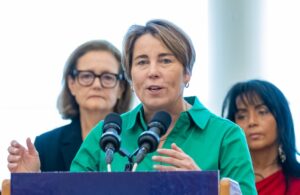Who is a member?
Our members are the local governments of Massachusetts and their elected and appointed leadership.

Gov. Maura Healey signed the Healey-Driscoll Administration’s ReiMAgine Aging 2030 executive order to support aging communities in Massachusetts during a visit to the Center for Active Living in Plymouth on May 8. (Photo courtesy Joshua Qualls/Governor’s Press Office)
At an event in Plymouth on May 8, Gov. Maura Healey signed an executive order and released a new age-friendly state plan intended to improve ways for Massachusetts agencies and communities to serve older adults.
The executive order directs all offices across the executive branch to identify areas where age-friendly policies and practices can be embedded in their work to improve the health and well-being of aging adults in Massachusetts. The order also establishes a Governor’s Advisory Group on Age-Friendly Policies and Practices to gather stakeholder and expert input on relevant areas, such as transportation, housing, regional planning, economic security, retirement and other issues affecting older adults and aging populations.
According to the administration, nearly a quarter of the state’s population, or 1.7 million adults, are over the age of 60.
“We know that far too many of our older residents are facing challenges, especially with affordability, housing and health care,” Healey said in a prepared statement. “To help ensure older adults in Massachusetts can live longer, healthier lives on their own terms, we are taking steps to make Massachusetts even more age- and dementia-friendly.”
The updated age- and dementia-friendly state plan provides a framework for both communities and state agencies to guide their age- and dementia-friendly actions for the next five years.
“ReiMAgine Aging 2030: The Massachusetts Plan” articulates the state’s vision and aspirations for growing older in Massachusetts. The plan includes an in-depth analysis of the state’s aging population and identifies challenges faced by older residents in Massachusetts. It also outlines strategies and actions that state agencies, local communities, community-based organizations, and the private sector can implement to ensure that Massachusetts is a great place for everyone to grow old.
The administration said the plan is an update of the previous state plan, which was released in 2019. The update was developed with significant community and stakeholder input.
“Since Massachusetts released its first age-friendly plan five years ago, the Commonwealth — and the country — have changed significantly, and some of the needs and goals of our older residents have changed with it,” said Health and Human Services Secretary Kate Walsh. “As we spoke to older adults to create this plan, we learned what matters most to today’s residents: serving them in their communities whenever possible, clear and effective communication, preventative care and mental health resources. This new plan is a guide to help us accomplish that.”
The following goals emerged from a series of community listening sessions held in 2024:
• Economic opportunity and security: Every older individual across Massachusetts can meet their basic financial needs
• People and communities: Older adults and families are empowered decision makers with meaningful connections to their communities
• Places and spaces: Natural and built environments enhance older adults’ mobility and livability
• Health and wellness: Older adults have optimal health for a high quality of life
• Aging in all policies: All local, regional and statewide policies consider the implications for older adults
• Information, communication and framing: Information is broadly accessible and reframes aging to value older adults
In recognition of Older Americans Month, Healey, Lt. Gov. Kim Driscoll, and Aging and Independence Secretary Robin Lipson visited the Plymouth Center for Active Living on May 8 to discuss how communities across the state can implement the new state plan.
Plymouth Town Manager Derek Brindisi said nearly half (47%) of his town’s population is age 50 and older, compared to approximately 38% statewide.
“It is essential that we remain dedicated to initiatives that support older adults in our community,” he said. “We appreciate the ongoing commitment of the Healey-Driscoll administration to fostering age-friendly policies that enhance the quality of life for Plymouth’s seniors.”
Earlier this year, AARP reported that Massachusetts was named the top destination for older adults moving to a new state specifically for retirement in 2024.
In January, the governor signed legislation to rename the Executive Office of Elder Affairs to the Executive Office of Aging and Independence, to better represent and reflect the values of older adults in Massachusetts.